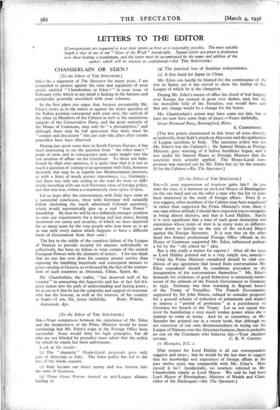[To the Editor of THE SPECTATOR.]
Sto,—Your comparison between the experience of Mr. Eden and the inexperience of the Prime Minister would be more convincing had Mr. Eden's reign at the Foreign Office been successful. None would deny his high principles, but all who are not blinded by prejudice must admit that the policy for which he stands has been unfortunate.
Look at the results :
(I) The " shameful " Hoare-Laval proposals gave only part of Abyssinia to Italy. The Eden policy has led to the loss of the whole country.
(2) Italy became our bitter enemy and was thrown into the arms of Germany.
(3) Three Great Powers formed an anti-League alliance leading to (4) The practical loss of Austrian independence.
(5) A free hand for Japan in China.
Mr. Eden can hardly be blamed for the continuance of the war in Spain, yet it has served to show the futility of that League of which he is the champion.
During Mr. Eden's tenure of office the cloud of war hanging over Europe has seemed to grow ever darker, and, but for the incredible folly of the Socialists, one would have said that any change would be a change for the better. .- Mr. Chamberlain's action may have come too late, but at least we now have some hope of peace.—Yours faithfully, Great Hormead Bury, Buntingford, Herts.
S. CODRENGTON.
[The five points enumerated in this letter all arise directly, or indirectly, from Italy's attack on Abyssinia and the application of League sanctions to Italy. The sanctions policy was not Mr. Eden's but the Cabinet's ; Sir Samuel Hoare, as Foreign Minister, gave warning of it before hostilities began, and it was under Sir Samuel Hoare as Foreign Minister that the sanctions were actually applied. The Hoare-Laval com- promise was rejected not by Mr. Eden but (a) by the country (b) by the Cabinet—ED. The Spectator.]






































































 Previous page
Previous page